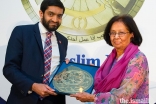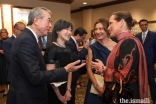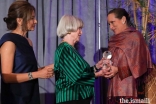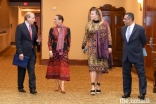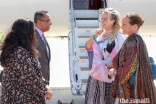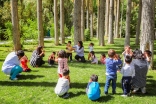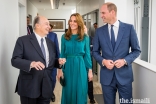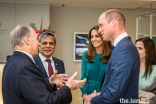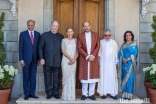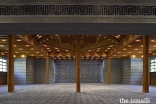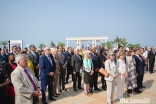Content Tagged with Global
What does it mean to live within the ethics of Islam? How does this apply to those in conflict? On the last day of Mediation Week, we explore how the ethics of Islam underpin the work of the CAB system how CAB mediators help to create an ethical culture of mediation.
Effective listening can be powerful. It demonstrates empathy, understanding, compassion, and most importantly, it shows care for what someone is saying. Active listening is not only a vital skill to help manage conflict, it can also help to improve our day-to-day interactions. On day five of Mediation Week, we explore the power of effective listening and the role of empathy in mediation.
We often hear of the need to employ best practice in our daily lives, not least when serving the community. On day four of Mediation Week, we learn about the type of training that Conciliation and Arbitration Board (CAB) members receive, and how CABs use best practice in their training to assist parties with resolving disputes.
On 16 October, Dr Amina Jindani was bestowed with a Professorship by St. George’s, University of London, in honour of her years of service and momentous contribution to the field of medicine. We sat down with Dr Jindani to discuss her childhood decision to become a doctor, her work which has spanned over 40 years in the field of medicine, and her recent award of Professorship.
Mediation Week is recognised in countries around the world every October to highlight the value of Alternative Dispute Resolution (ADR) as a constructive and cost-effective alternative to litigation. This year, the Ismaili International Conciliation and Arbitration Board (ICAB) have prepared a series of six videos that provide information about mediation and the CAB system, as well as other areas of mediation and conflict management.
Confidentiality is the foundation of the mediation process. But, what does it mean, and what information is considered to be confidential? On day three of Mediation Week, we learn about the role of confidentiality and why it is important to the mediation process.
Have you considered mediation? Mediation is a voluntary and confidential process in which a neutral third-party assists disputing parties to reach their own settlement. On day two of Mediation Week, we learn about mediation and how it can help to resolve a dispute in a peaceful and cost-effective manner.
Mediation Week is recognised in countries around the world every October to highlight the value of Alternative Dispute Resolution (ADR) as a constructive and cost-effective alternative to litigation. This year, the Ismaili International Conciliation and Arbitration Board (ICAB) have prepared a series of videos that provide information about mediation and the CAB system, as well as other areas of mediation and conflict management. On day one of Mediation Week, we learn about the CAB system and its role in helping to improve the quality of life of members of the Jamat and beyond.
The Asia Society Texas Center presented Princess Zahra with their highest honour, the Huffington Award, for her tireless work to uphold human dignity, develop future leaders, and spearhead health and education initiatives in more than 30 countries around the world.
On 10 October 2019, Princess Zahra, accompanied by her daughter, Miss Sara Boyden, was honoured with the Asia Society Texas Center’s Huffington Award in Houston, USA. Princess Zahra was honoured for her outstanding contributions that have furthered international understanding, uplifted lives, and advanced health and education through her work with the Aga Khan Development Network.
The Asia Society Texas Center presented Princess Zahra with their highest honour, the Huffington Award, for her tireless work to uphold human dignity, develop future leaders, and spearhead health and education initiatives in more than 30 countries around the world.
Princess Zahra and her daughter, Miss Sara Boyden, arrived in Houston, Texas, earlier today at the invitation of the Asia Society Texas Center. Princess Zahra is being honoured with the Huffington Award at the annual Award Dinner being held later tonight.
Mental health is similar to physical health — everybody has it and should take care of it. When we reflect about our health in general, it is important to include the health of our minds as well as the health of our bodies in our thinking, plans, and conversations. On the occasion of World Mental Health Day, 10 October, we reflect on the importance of sound mind and a dignified quality of life.
We often hear that the children of today are the leaders of tomorrow; that they will shape the future; and that the destiny of humankind lies in their hands. On the occasion of World Teachers’ Day, 5 October 2019, we explore the positive impact made by teachers and educators within the Jamat and beyond.
On a crisp autumnal morning in London’s King’s Cross, Mawlana Hazar Imam welcomed Their Royal Highnesses The Duke and Duchess of Cambridge to the Aga Khan Centre, for a special event to celebrate the culture and heritage of Pakistan, and the contributions of the Pakistani diaspora to British society.
At the Aga Khan Centre on 2 October 2019, Mawlana Hazar Imam hosted Their Royal Highnesses the Duke and Duchess of Cambridge. The special event provided a platform for guests whose interests and engagements encompass the wide-ranging relationship between the UK and Pakistan, including members of the Pakistani diaspora making a meaningful contribution to society in the United Kingdom and beyond.
Prince Hussain, second son of Mawlana Hazar Imam, married Ms Elizabeth Hoag in a private ceremony on 29 September 2019, in Geneva, Switzerland. Attended by immediate family members, the proceedings took place in accordance with Muslim tradition.
Up close, a jewel is made up of a number of facets, each producing intriguing patterns, which help the gem to shine. Nestled amid flourishing trees, a flowing river, and a formidable mountain range, the Ismaili Jamatkhana and Centre in Khorog adds another facet to the ‘Jewel of the Pamir.’
The Aga Khan Development Network hosted a reception in Maputo, Mozambique, last month, to celebrate Imamat Day with guests and members of the Jamat, and to raise awareness of AKDN’s work in the region.
It’s become an oft repeated cliché that we live in times of exponential change, driven by disruptive technologies, shifting global politics, changing human behaviour, and newly emerging social norms. And yet, as we enter the era of the fourth industrial revolution, we may be witnessing the greatest amount of change ever seen in a single human lifetime.





